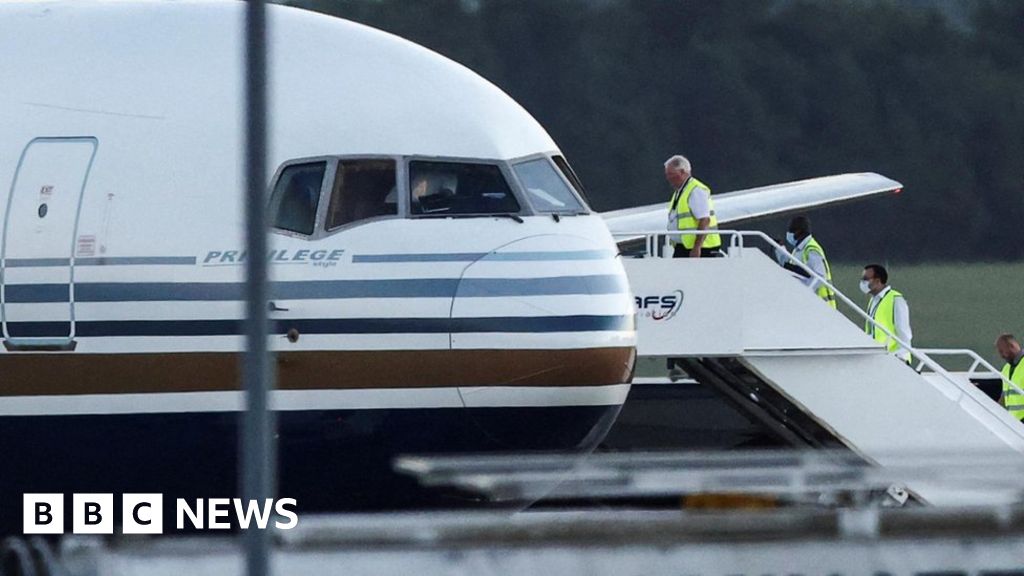- Dominic Casciani
- Family and Law Correspondent
The Rwandan government's bill to send British asylum seekers to be processed in Africa has finally been approved by parliament after two years of legal battles and political wrangling. So how soon is a flight to Kigali likely to take off?
Let's just say that the engines on government planes will be quiet tomorrow too.
The bill is currently going through Parliament, but technically the earliest time planes can take off is 12 days after the King gives Royal Assent, which would make the bill official.
In reality, the date of the first flight is likely to be later, with Chancellor Rishi Sunak saying 10 to 12 weeks, or late June or early July.
Mr Sunak acknowledged on Monday that the government would miss the spring airmail deadline, saying it was “later than we would have liked”. “But it was always clear that the process would take time.”
52,000 people
The only people who could be sent to Rwanda are asylum seekers – people seeking protection in the UK who arrive without permission from another safe country.
This essentially means people riding in dinghies to cross the English Channel. It should be emphasized that this is before the government determines whether they are genuine refugees, and their legal claims for protection will be processed in Rwanda.
There are 52,000 people in this pool.
They are currently staying in Home Office-funded accommodation and are not allowed to work. As the case is yet to be heard, they will either be expelled from the UK or given asylum to start a new life in their homeland.
And the government is unlikely to get them all on planes anytime soon. Even if the number of deportations by the Home Office reached the peak of 15,000 per year at the end of 2012, it would take more than three years to eliminate them all.
This number has fallen following sector cuts and Brexit, but now stands at 5,000 a year again.
The time it takes from being picked up in the English Channel to becoming a tropical fever in Rwanda is about two weeks at the earliest.
Once authorities select migrants who meet the government's criteria, they are given at least seven days' notice that they may be placed on a plane. Officials can then tell them they will board the plane in five days.
A 7+5 notice period (extended by one week if someone is not detained in an immigration removal center) means eligible individuals can receive advice on whether they wish to contest transportation to Rwanda To do.
If authorities deny their petition, immigrants can try to go to court.
Once there, potential passengers will ask a judge to seek a court injunction to temporarily block their deportation to Rwanda. An injunction would give them time to prepare a lawsuit. If multiple immigrants receive injunctions at the same time, the entire plane could be grounded.
legal challenge
In June 2022, the fight to put the brakes on the first flight went all the way to the European Court of Human Rights (ECHR). The first flight to Rwanda was canceled minutes before takeoff following a court ruling.
The ECHR has informed ministers that the plane cannot depart until British judges have had the opportunity to properly consider the arguments being made against the Rwanda plan. The UK Supreme Court subsequently ruled unanimously that the Rwanda project was illegal.
Migrants will face an extremely tough challenge in court because Rwanda's new law tells judges to ignore a range of human rights safeguards built into Britain's complex constitution.
As a result, it is expected that expert refugee organizations will also come knocking on the doors of the courts and launch a wide-ranging challenge to the plan.
There is also speculation that unions involved in the immigration system and civil servants may join the fight if they conclude that the order, which ignores human rights law in preparing to send migrants, is itself unlawful.
Finally, a lawsuit may even be filed to examine the plan's most controversial legal elements. The new law orders courts to treat Rwanda as a safe country, but the Supreme Court has said it is not currently a safe country.
The legal equivalent of fireworks is expected there. This is because it raises the issue of the government tying the hands of an independent judiciary.
And the battle could soon reach Europe. The law clearly precludes UK courts from grounding an aircraft except in the most exceptional circumstances.
Unless the UK Supreme Court intervenes to suspend the flights, the migrants will end up going to the ECHR.
They will argue that the law violates international safeguards against harm to people. Strasbourg will only intervene if there is a risk of irreparable harm to migrants.
Ministers have created new powers to override injunctions if the ECHR orders aircraft to remain on the runway.
The government has said it can ignore the ECHR's “interim measures”, but most lawyers disagree, arguing that it would be a violation of international law.
What is the actual effect?
Last year, France ignored an interim order from the European Court of Human Rights not to deport the man to Uzbekistan. As a result, the Supreme Court in Paris ordered the government to bring the man back, much to the embarrassment of ministers and officials.
And there may be another sting in the tail.
Even if the first flight takes off without court intervention, it doesn't end there.
In the worst-case scenario for ministers, the deported immigrant could later be ruled by a judge to have a genuine case and the government could be ordered to return him to the UK.
It's rare, but this has happened before, and it's unlikely to happen before a general election.


